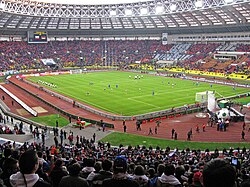Overview
This match and the earlier between both nations in Euro 2000 qualifying, which Ukraine won 3–2, remain the only times Russia and Ukraine have faced each other in official competition. [1] In addition to the football ramifications, the game had a wider significance as a contest between two neighboring former Soviet countries and was attended by many Russian celebrities as well as Prime Minister Vladimir Putin. [2]
Entering the match, Russia needed a win to guarantee progression to the Euro 2000, while Ukraine only needed a draw to guarantee at least 2nd place and thus a play-off berth. Needing a win, Russia was on the attack much of the game looking for a go-ahead goal. [3]
In the 75th minute Valeri Karpin opened the score with a powerful free kick. [3] This appeared to provide Russia the result they needed, and Ukraine was heading out of qualifying. However, in the 87th minute, Andriy Shevchenko sent a long free kick towards the Russian goal. The shot appeared to be savable, but Russian goalkeeper Aleksandr Filimonov was surprised by the effort and, trying to catch the ball, knocked it into his own net. [3]
The match ended in a 1–1 draw, [4] which combined with other results left Ukraine in second place behind France. Ukraine qualified for a two-match play-off, which they lost to Slovenia, while Russia fell to third place and were eliminated from qualifying.
Aftermath
The two Euro 2000 qualifiers remain the only time that Russia and Ukraine have played each other in an international "A" match, giving Ukraine the head-to-head advantage of one win and one draw. [5]
Following the start of the Russo-Ukrainian War in 2014, UEFA decreed that representative teams from either nation at club and international level cannot play against each other outside of knockout competitions. [6] After the Russian invasion of Ukraine in 2022, the Russian Football Union has been suspended from FIFA and UEFA. [7]
This page is based on this
Wikipedia article Text is available under the
CC BY-SA 4.0 license; additional terms may apply.
Images, videos and audio are available under their respective licenses.

